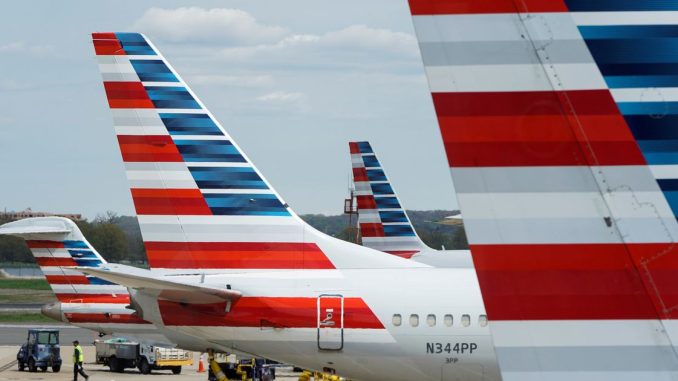
Pilots at American Airlines voted overwhelmingly to authorize a strike as they try to reach a new contract ahead of the summer travel season.
The likelihood of a work stoppage remains low, however, because airline industry workers face several hurdles before they can legally walk off the job.
Capt. Ed Sicher, president of the Allied Pilots Association, said pilots were determined to win changes to scheduling that would “improve the airline’s operational reliability and efficiency.”
“We will strike if necessary to secure the industry-leading contract that our pilots have earned and deserve ― a contract that will position American Airlines for success,” Sicher said.
The union announced the results of the vote on Monday. It said 99% of pilots had voted in favor of authorizing the strike, with 96% of American’s 15,000 pilots participating in the vote throughout April. Pilots planned to hold informational picket lines at ten major airports on Monday.
“Pilots want a better quality of work life. They want to know that if they’re scheduled for a four-day trip that they’ll be back home with their families after four days.”
– Dan Koller, spokesperson, Allied Pilots Association
American and the union have been trying to negotiate a contract since January 2019. The airline said in a statement it was confident a deal could be “finalized quickly.”
“The finish line is in sight,” an airline spokesperson said in an email. “We understand that a strike authorization vote is one of the important ways pilots express their desire to get a deal done and we respect the message of voting results.”
Like rail workers, airline employees are subject to a different set of collective bargaining rules, and it’s more difficult for them to walk off the job than most other private-sector workers. The American pilots would first have to go through mediation with a government board and receive legal permission to strike.
The two sides are still in what is known as “direct negotiations” and have not yet requested mediation, which would be a preliminary step ahead of a strike.
Dan Koller, a union spokesperson, told HuffPost that the strike authorization was “not about money.” Instead, it was primarily about scheduling, which he called “chaotic and unpredictable” for workers.
“Pilots want a better quality of work life,” Koller said in an email. “They want to know that if they’re scheduled for a four-day trip that they’ll be back home with their families after four days. They want to know that if they bid for a layover in, say, New Orleans and make plans to meet friends there that the airline won’t send them to Buffalo instead at the drop of a hat.”
Koller said negotiations have dragged on for so long only partly because of the pandemic, which caused a massive slowdown in air travel before a strong rebound. “American Airlines management dragged their feet before COVID and has continued to do so as the industry recovered,” Koller said.
American Airlines said it was “working expeditiously” to finalize the contract. “We remain focused on completing the handful of matters necessary to reach an agreement our pilots deserve,” the spokesperson said.
Airlines have struggled to retain pilots and other crew amid low unemployment and a strong travel economy, giving workers more leverage in negotiations. Pilots at American competitor Delta recently reached a new contract with the carrier that includes 34% pay raises over the course of four years.
The industry’s contracts typically pattern off one another, and the Delta agreement could set the framework for agreements not just at American but United and Southwest as well.


Be the first to comment